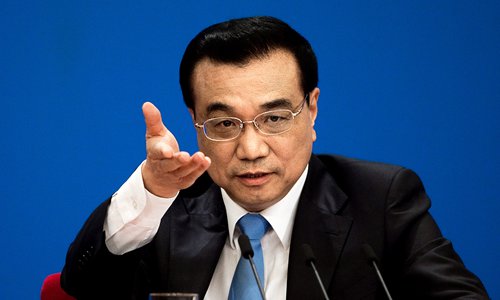
Chinese Premier Li Keqiang speaks during a press conference after the closing ceremony of the annual session of China's legislature, the National People's Congress, in Beijing on Wednesday. Premier Li warned the US against starting a trade war while expressing optimism that the world's two largest economies could keep relations steady despite frictions in the Trump era. Photo: AFP
China does not wish to see Southeast Asian countries taking sides between China and the US, and envisions the Asia-Pacific to be a stable and orderly region, Premier Li Keqiang said Wednesday.
China does not want to see any party feeling compelled to choose sides between China and the US under the influence of a Cold War mentality, the premier said at a press conference in Beijing at the closure of this year's two sessions, during which Li discussed a range of topics, including the Korean Peninsula, the South China Sea and China's economic growth.
Li said that China hopes the Asia-Pacific region will be one that enjoys good order and stability, a region that is able to work out issues through consultation and principles, properly manage differences and has the wisdom to resolve differences.
"I believe the message is that China hopes the Trump administration would not inherit Obama's Asia-Pacific policies," said Sun Chenghao, assistant research fellow at the Institute of American Studies of the China Institutes of Contemporary International Relations. "Obama's Pivot to Asia strategy aimed to build a multilateral military alliance involving Japan, South Korea and Australia, a mechanism that inevitably targets a certain country or at least it makes China feel that way," Sun said.
He said that a better option for the Trump administration would be to build a more comprehensive Asian-Pacific security mechanism, in which more countries can participate.
Analysts said there has not yet been a clear Asia-Pacific strategy coming from the Trump administration, and most of Trump's policies so far are seemingly crafted toward solving a specific problem, such as the North Korean nuclear and missile threat.
No trade war
"China does not want to see a trade war between the world's largest and second-largest economies," Li said. "That will not make our trade fairer but will hurt us both," he said.
If there were a trade war, foreign-invested companies, particularly US firms, would first bear the brunt, Li said, citing an article written by an international think tank which he did not name.
The Premier's remarks came ahead of a proposed meeting between President Xi Jinping and Trump next month. US Secretary of State Rex Tillerson will arrive in Beijing on Saturday, where he is expected to build a framework for talks ahead of the summit.
Li said at the press conference that "diplomatic departments of the two countries are in close contact" concerning a meeting between the presidents.
The Sino-US relationship is crucial not just to the two countries, but also to regional and global peace, security and stability, Li said. Sino-US ties have been going forward despite various twists and turns, the premier said, but he feels optimistic about future bilateral relations. "After several decades of growth of bilateral relations, the two countries now share a wide range of common interests," Li said.
Liu Wei, an assistant research fellow with the Chinese Academy of Social Sciences, said that despite the threats Trump hurled at China, the bilateral trade structure has not changed and Trump has so far not taken protective measures any more aggressive than his predecessor's.
Liu noted that although some US industries, such as steel, textile and plastics, have suffered losses in bilateral trade, they have not dominated the overall US trade policy toward China, as other US industries have greatly benefited from the trade ties.
Zhong Shan, Chinese minister of commerce, said at a press conference last week during the two sessions that 26 percent of Boeing planes, 56 percent of US soybeans, 16 percent of US cars and 15 percent of US integrated circuits are sold to China.
The premier took the opportunity to reaffirm China's consistent position to champion globalization and support free trade. "China will open its door wider and wider," Li said.
Globalization and world peace, development and cooperation are inseparable, Li said, adding that closing the door and making beggar-thy-neighbor policies will solve no problems.
China, like many other countries, is a beneficiary of globalization, as the country has been consistently expanding its opening up, the premier said.
Last year, China attracted $126 billion in foreign direct investment, remaining the largest recipient among developing countries, data showed.
The World Bank evaluation showed China's business environment saw continuous improvement during the past three years.
"We are committed to make China a highland of opening up and a popular destination of investment, and share the development opportunities with the world," Li said.
Xinhua contributed to this story
